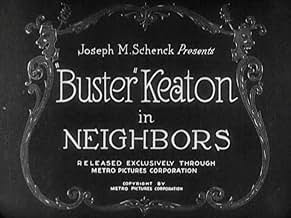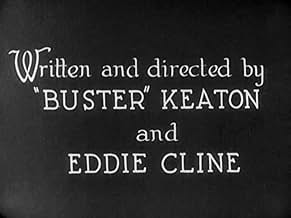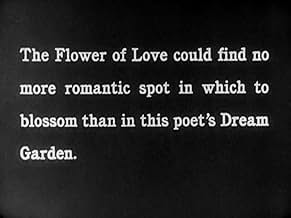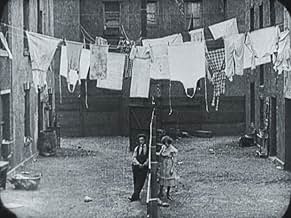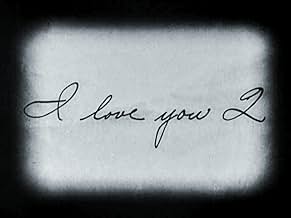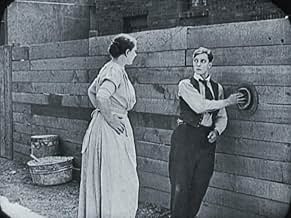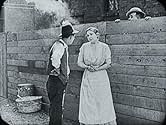NOTE IMDb
7,5/10
4,9 k
MA NOTE
Ajouter une intrigue dans votre langueA young couple who live next to each other in tenement apartments do everything they can to be together despite of their feuding families.A young couple who live next to each other in tenement apartments do everything they can to be together despite of their feuding families.A young couple who live next to each other in tenement apartments do everything they can to be together despite of their feuding families.
- Réalisation
- Scénario
- Casting principal
Edward F. Cline
- The Cop
- (non crédité)
Jack Duffy
- The Judge
- (non crédité)
The Flying Escalantes
- Themselves
- (non crédité)
Virginia Fox
- The Girl
- (non crédité)
Joe Keaton
- His Father
- (non crédité)
Joe Roberts
- Her Father
- (non crédité)
Avis à la une
This is one of the few short films that was understated on the back on the DVD. Usually they make it sound better than it often winds up. Despite little buildup, this was tremendous fun for 18 minutes.
The very beginning is very innocent as Harold and Virginia Fox exchange love notes through a peephole in a fence that divides their family's tenement properties. Quickly, the parents of each come out, intercept the messages, disapprove, meddle further and then get involved in one wild and crazy scene after another. Featured are some terrific stunts and just general madness and mayhem with one funny sight gag after another. This is so frenetic that it has to be seen, not read about. Just be ready for a wild ride of feuding neighbors and cops.
It does calm down for a minute or two when a judge makes the parents sign a "peace treaty." Harold then announces he and Virginia are going to get married.....and they try to do that but, a combination of pants that won't stay up (don't ask) and Virginia's father, Big Joe Roberts, break that up. Now we go back to slapstick and clever scenes as Buster's friends help get his girl back. It's another crazy finish, albeit a short one.
It's very inventive stuff and one of Harold's best. It is an extra on the "Seven Chances" DVD. Note: Playing Buster's dad in here was his real-life father, Joe Keaton.
The very beginning is very innocent as Harold and Virginia Fox exchange love notes through a peephole in a fence that divides their family's tenement properties. Quickly, the parents of each come out, intercept the messages, disapprove, meddle further and then get involved in one wild and crazy scene after another. Featured are some terrific stunts and just general madness and mayhem with one funny sight gag after another. This is so frenetic that it has to be seen, not read about. Just be ready for a wild ride of feuding neighbors and cops.
It does calm down for a minute or two when a judge makes the parents sign a "peace treaty." Harold then announces he and Virginia are going to get married.....and they try to do that but, a combination of pants that won't stay up (don't ask) and Virginia's father, Big Joe Roberts, break that up. Now we go back to slapstick and clever scenes as Buster's friends help get his girl back. It's another crazy finish, albeit a short one.
It's very inventive stuff and one of Harold's best. It is an extra on the "Seven Chances" DVD. Note: Playing Buster's dad in here was his real-life father, Joe Keaton.
An imposible love story becomes pretext for gags and fascinating adventures. And start point for a great reflection of the genius of one of magnificent actors. A film who could be a Chaplin one. But the difference consists, first, in the force of nuances. And in the impecable art of Buster Keaton to transform ordinary situations in roots of impressive gems.
This Buster Keaton short has some outstanding and breathtaking stunts. You have to see it to believe it.
Buster is in love with his neighbour. They send notes through a hole in the fence. Their respective fathers disapprove of the romance.
Buster is determined to marry his girl even though he goes through a series of mishaps involving both families and the police.
The plot itself is frothy and silly. Buster constantly gets detained by a policeman and then escapes. At one point he is blacked up when escorted by a policeman and then runs away for the policeman to arrest a black man who walks past.
Given that this short was made in 1920. This is still the early days of cinema. Some of the physical acrobatic stuff Buster does is impressive, including three men standing on top of each other which happens at the end. A few times I had to rewind it and watch it again.
Buster is in love with his neighbour. They send notes through a hole in the fence. Their respective fathers disapprove of the romance.
Buster is determined to marry his girl even though he goes through a series of mishaps involving both families and the police.
The plot itself is frothy and silly. Buster constantly gets detained by a policeman and then escapes. At one point he is blacked up when escorted by a policeman and then runs away for the policeman to arrest a black man who walks past.
Given that this short was made in 1920. This is still the early days of cinema. Some of the physical acrobatic stuff Buster does is impressive, including three men standing on top of each other which happens at the end. A few times I had to rewind it and watch it again.
Being one of Keaton's earliest and most recognised short film, Neighbours is full of passion, fast-paced, frantic and at times even romantically touching. It's innocent, light-hearted and airy, and just about sums up Buster's earliest work, going from slapstick nonsense to refreshing (for the time) character-driven gags that deliver just as well. Sure enough the feature is not without its drawbacks which do hinder the overall pacing and breezy feeling present in the short's best moments. Much like The Balloonatic, the greatest parts here lie in acts one and three, with the middle section giving way to fine moments of zany antics, but with plenty of superfluous additions to boot.
The plot here follows a young man and woman madly in love as they attempt to bring themselves together against their begrudging families. What follows is a piece of hilarious and wild twenty minute entertainment full of laughs and great images. Keaton himself is truly captivating as always, and delivers some of his most inspired and tricky stunts here which do well to thrill and bring up a laugh or two out of the sheer spectacle of what is going on. Throw in a beautiful supporting actress, and a whole host of very vivid personalities backing Buster, plus troublesome trousers, quarrelling families and you have a film that is sure to stick with you, despite its obvious inconsistencies and less successful moments.
For more of my reviews, please visit here: http://www.invocus.net
The plot here follows a young man and woman madly in love as they attempt to bring themselves together against their begrudging families. What follows is a piece of hilarious and wild twenty minute entertainment full of laughs and great images. Keaton himself is truly captivating as always, and delivers some of his most inspired and tricky stunts here which do well to thrill and bring up a laugh or two out of the sheer spectacle of what is going on. Throw in a beautiful supporting actress, and a whole host of very vivid personalities backing Buster, plus troublesome trousers, quarrelling families and you have a film that is sure to stick with you, despite its obvious inconsistencies and less successful moments.
For more of my reviews, please visit here: http://www.invocus.net
A viewer who has never seen a Buster Keaton comedy might get the wrong idea of what to expect from this film's introductory title card, which reads: "The Flower of Love Could Find No More Romantic Spot in Which to Blossom Than in This Poet's Dream Garden." We are then shown a grungy courtyard between two tenement buildings divided by a fence, and on opposite sides of the fence we find The Boy (Buster) and The Girl (Virginia Fox), sweetly in love but kept apart by feuding parents. But fear not, for the flowery wording of that introduction is meant in jest: Neighbors is no exercise in Griffith-style sentimentality about poor people. (For one thing, if D.W. Griffith had directed this he'd have called it "Romeo & Juliet of the Slums" or perhaps "Pyramis & Thisbe of Pig Alley.") This isn't a melodrama of life among the lowly, it's Buster in his youthful prime, and it's funny. There's action and comedy galore, and it's interesting to observe that the attitude expressed towards love and marriage is far from sentimental --which is a little surprising, considering that 24 year-old Buster was still a fun-loving bachelor when he made this movie.
In any event, once the situation is established we are treated to a series of fast-moving gag sequences emphasizing the hostile relationship between The Girl's father (played by Buster's frequent screen nemesis Big Joe Roberts) and The Boy's father (played by Buster's own dad Joe Keaton). It is clear that the two fathers hold each other in contempt, and vigorously oppose any closer relationship between their respective families. There's a great example of Keaton's special brand of physical comedy early on when Buster attempts to visit Virginia in her third floor room. When he's caught by her father he promptly flings himself out her window, across a clothesline that leads to his own window across the way, down a banister and back across the clothesline to Virginia's building, right smack into Big Joe. The sequence flashes by in seconds and may leave you blinking in amazement, but before you can catch your breath Buster has been forcibly hung upside down by his feet from the clothesline, hauled back across the courtyard like dirty laundry, and then (accidentally) beaten by his father, who has mistaken his own son for a rug. Moments later, Buster is dumped head-first through a rain barrel into sopping wet mud. And so it goes! Welcome to This Poet's Dream Garden.
Neighbors is a comedy better seen than described. At times it feels like a live-action Warner Brothers cartoon, but instead of Bugs Bunny and Yosemite Sam we're watching actual people perform these stunts. The premise of feuding families is a simple and effective framework for Keaton's terrific set-pieces. (He would return to the family feud motif on a much grander scale in Our Hospitality a few years later.) The rougher slapstick material is briefly held in check as the brawling families are dragged into court, chastised by a judge, and ordered to permit their offspring to wed. But needless to say the ceremony is a disaster, and the action resumes with a wild finale in which Buster and Virginia escape from their families to elope. The best gag sequence is saved for last, as Buster takes part in a three-man balancing act racing through the streets, a bit that required the participation of the Flying Escalantes, a team of acrobats Buster knew from his vaudeville days. Latter day cartoon directors such as Chuck Jones and Tex Avery often gave credit to the influential silent era comedians they'd admired as kids, and the finale of this film must surely have been the sort of thing they were talking about.
While Neighbors may not rank in the very top tier of Keaton's output it's an exhilarating, highly amusing comedy that holds up well today. Besides, Buster's second-echelon efforts are better than most anyone else's masterworks!
In any event, once the situation is established we are treated to a series of fast-moving gag sequences emphasizing the hostile relationship between The Girl's father (played by Buster's frequent screen nemesis Big Joe Roberts) and The Boy's father (played by Buster's own dad Joe Keaton). It is clear that the two fathers hold each other in contempt, and vigorously oppose any closer relationship between their respective families. There's a great example of Keaton's special brand of physical comedy early on when Buster attempts to visit Virginia in her third floor room. When he's caught by her father he promptly flings himself out her window, across a clothesline that leads to his own window across the way, down a banister and back across the clothesline to Virginia's building, right smack into Big Joe. The sequence flashes by in seconds and may leave you blinking in amazement, but before you can catch your breath Buster has been forcibly hung upside down by his feet from the clothesline, hauled back across the courtyard like dirty laundry, and then (accidentally) beaten by his father, who has mistaken his own son for a rug. Moments later, Buster is dumped head-first through a rain barrel into sopping wet mud. And so it goes! Welcome to This Poet's Dream Garden.
Neighbors is a comedy better seen than described. At times it feels like a live-action Warner Brothers cartoon, but instead of Bugs Bunny and Yosemite Sam we're watching actual people perform these stunts. The premise of feuding families is a simple and effective framework for Keaton's terrific set-pieces. (He would return to the family feud motif on a much grander scale in Our Hospitality a few years later.) The rougher slapstick material is briefly held in check as the brawling families are dragged into court, chastised by a judge, and ordered to permit their offspring to wed. But needless to say the ceremony is a disaster, and the action resumes with a wild finale in which Buster and Virginia escape from their families to elope. The best gag sequence is saved for last, as Buster takes part in a three-man balancing act racing through the streets, a bit that required the participation of the Flying Escalantes, a team of acrobats Buster knew from his vaudeville days. Latter day cartoon directors such as Chuck Jones and Tex Avery often gave credit to the influential silent era comedians they'd admired as kids, and the finale of this film must surely have been the sort of thing they were talking about.
While Neighbors may not rank in the very top tier of Keaton's output it's an exhilarating, highly amusing comedy that holds up well today. Besides, Buster's second-echelon efforts are better than most anyone else's masterworks!
Le saviez-vous
- AnecdotesIncluded in "Buster Keaton: The Shorts Collection" blu-ray set, released by Kino.
- Citations
His Father: He's my son and I'll break his neck any way I please!
- ConnexionsEdited into The Golden Age of Buster Keaton (1979)
Meilleurs choix
Connectez-vous pour évaluer et suivre la liste de favoris afin de recevoir des recommandations personnalisées
Détails
- Durée18 minutes
- Mixage
- Rapport de forme
- 1.33 : 1
Contribuer à cette page
Suggérer une modification ou ajouter du contenu manquant

Lacune principale
By what name was La voisine de Malec (1920) officially released in Canada in English?
Répondre
